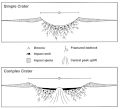Lumparn
Description
Most of the bay fills a nine kilometer wide impact structure. The structure is estimated to be about 1000 million years old (Proterozoic). The depression was originally believed to be a rift. Extraterrestrial origin was first proposed in 1979, but not until 1993 was the impact structure finally confirmed. Long shatter cones have been discovered in the southwestern part of the bay. The remains of the crater are filled with sediments. Between Pleistocene sediments and crushed rapakivi granite bedrock there is a layer of Paleozoic (Ordovician) limestones. This makes Lumparn one of the few places in Finland where fossils have been found.
The bay has also previously been referred to as Lumpari in some Finnish documents, though the Research Institute for the Languages of Finland does not list Lumpari as in current usage.
Gallery

See also
References
- ^ "Lumparn". Earth Impact Database. Planetary and Space Science Centre University of New Brunswick Fredericton. Retrieved 2009-08-15.
- ^ Lumpari World Water Features Database | WorldCityDB.com Archived 2007-09-27 at the Wayback Machine
- ^ Svenska Ortnamn i Finland Archived 2007-11-13 at the Wayback Machine, The Research Institute for the Languages of Finland, see "Lumparn"
External links
- Lumparn impact structure (archived link)
- (in Finnish) The Landforms of Finland
- Svensson, N.-B. (1993). "Lumparn Bay: A Meteorite Impact Crater in the Aland Archipelago, Southwest Finland". Meteoritics. 28 (3): 445. Bibcode:1993Metic..28S.445S.
- Map of Lumparn

